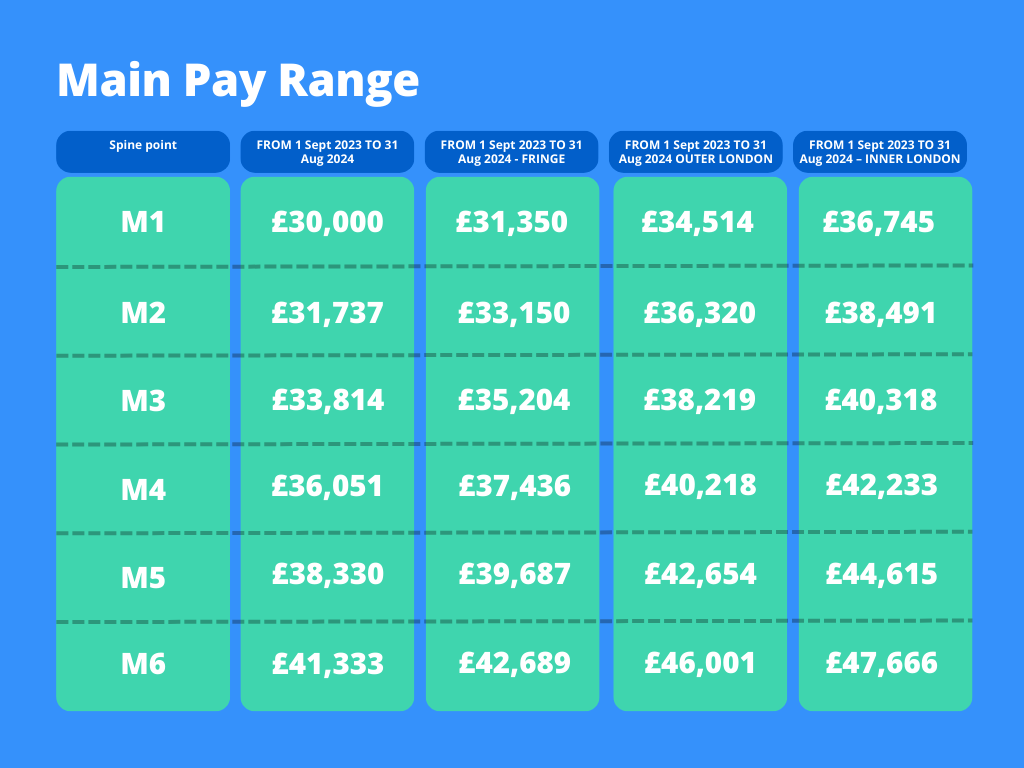Teacher Salary Guide: How Much Can UK Teachers Expect to Earn in 2024?

As a teacher in the UK, it's important to have a clear understanding of your salary and how it may change over the course of your career. In this comprehensive guide, we'll explore the latest information on teacher salaries for the academic year 2023-24. From the starting salary for Early Career Teachers (ECTs) to the pay scales for qualified teachers, we'll cover it all.
Understanding the Teacher Pay Scale
The pay scales for teachers in the UK are established guidelines that dictate the minimum and maximum pay rates for various teaching positions. These pay scales are influenced by factors such as qualifications, experience, and additional responsibilities.
For teachers working in state schools, the agreed pay scale ensures fair and equal compensation across the education sector. It is designed to eliminate discriminatory practices and provide transparency in salary calculations. Let's delve into the intricacies of how these pay scales work.
How does the Teacher Pay Scale work?
The pay scale for teachers is structured in a way that encourages professional growth and rewards experience. Teachers typically start at the lowest point of the main pay scale, progressing through various levels based on their experience and performance.
In England, for instance, the pay scale is divided into the main pay scale (MPS) and the upper pay scale (UPS), with teachers moving up based on performance, expertise, and years of service.
The Department for Education (DfE) in England makes annual recommendations for teacher pay scales, which are informed by the findings of the School Teachers' Review Body (STRB). Similarly, in Northern Ireland, Scotland, and Wales, teacher pay scales are set by the respective education authorities.
Teacher Pay Ranges
Teacher pay ranges in the UK vary largely based on the role, qualifications, and experience of the teacher. The pay scale typically starts with unqualified teachers and extends up to headteachers, with several categories in between. Each category has its own pay range, which is further influenced by geographical location and additional responsibilities.
A qualified teacher typically starts on the Main Pay Scale (M Scale) and can progress to the Upper Pay Scale (UPS) based on performance, years of service, and meeting certain criteria set by the educational authority or the school. The transition from the Main to Upper Pay Scale is not automatic and involves a formal assessment process.
Teacher Pay Scales:


These figures represent the prospective salary ranges for the academic year 2023-24, subject to the acceptance of the pay offer made in July. It's important to note that these figures are illustrative and may vary depending on the specific circumstances and agreements in place at your school.
What to expect from role specific salaries:
Unqualified Teacher Salary
Unqualified teachers are those who have not yet achieved Qualified Teacher Status (QTS). The pay scale for unqualified teachers ranges from £20,598 to £32,134. The exact point within this scale is determined by factors such as previous teaching experience and relevant skills.
ECT Teacher Salary
An ECT is a teacher who has just completed their initial teacher training and has been awarded Early Career Teacher (ECT), but is yet in their first year of teaching. In the 2023-24 academic year, the starting salary for ECTs is expected to be £30,000 in England and Wales, with the higher rate of £36,745 applicable in London due to the higher cost of living.
Qualified Teacher Salary
Once an ECT successfully completes their first year of teaching, they become a qualified teacher. The salary of a qualified teacher is guided by the main and the upper pay scales. In England and Wales, the main pay scale ranges from £30,000 to £46,525, and the upper pay scale ranges from £38,690 to £41,604. These scales are designed to reward experience and continued professional development.
Leadership Salary
The leadership pay range is applicable to headteachers, deputy headteachers, and assistant headteachers. In England, excluding London, salaries within this range extends from £47,185 to £131,056. Compensation is determined by factors such as experience and level of responsibility. These salary scales emphasise the importance of effective educational leadership in driving school progress and student achievement. The salary range is even higher in London due to the higher living expenses in the capital.
Headteacher Salary
Headteachers, due to their role as the lead educators and administrators of schools, are compensated at a higher rate compared to other teaching positions. In England, excluding London, the headteacher salary range extends from £53,380 to £131,056. The salary range is even higher in London due to the higher living expenses in the capital.
Early Career Teacher (ECT) Salary
Early Career Teachers, also known as ECTs, are those who are in their first years of teaching. The starting salary for ECTs can vary depending on several factors, including the location and type of school.
In general, an ECT can expect to start their career at the M1 point on the Main Pay Range. For the academic year 2023- 24, this translates to a salary between £30,000 and £36,745, with the exact amount depending on the teacher's location. ECTs working in or near London may receive higher salaries to account for the higher cost of living in the area.
You can read our full article on ECT salaries here.
It's worth noting that some schools, particularly academies or trusts, may have their own pay scales. These scales are typically similar to the national pay scale mentioned above, but it's important to check with your specific school to understand their salary structure.
In certain cases, a school may offer a starting salary higher than M1 to attract highly qualified ECTs. This can happen if the teacher possesses exceptional qualifications or relevant experience, such as an outstanding PGCE and prior teaching experience. Such cases may result in ECTs being offered a starting salary at M2 or M3 instead of M1.
Other Benefits for Teachers
In addition to salary, teachers in the UK enjoy several other benefits as part of their employment package. One of the most notable benefits is the teachers' pension scheme. Teachers' pensions are guaranteed by the government, providing financial security in retirement. Employers typically contribute a substantial amount to the pension scheme, which is linked to the teacher's salary.
Furthermore, teachers in certain subject areas, such as Science and Computer Science, may be eligible for loan reimbursements from their student loans. These reimbursements are intended to incentivise teachers to pursue careers in high-demand subjects and alleviate the burden of student loan debt. It's important to note that the specific benefits and eligibility criteria may vary depending on the school and local authorities. Teachers should consult their school's policies and agreements to fully understand the additional benefits available to them.
Salary Negotiations and Pay Discussions
When entering a new teaching position or discussing salary matters with your school, it's essential to approach the topic with clarity and confidence. During the interview process, seek clarification regarding the salary offered, ensuring that you have a clear understanding of the pay scale and any additional benefits associated with the role.
It's important to note that most employers will typically start ECTs at the M1 point on the Main Pay Range, as it is the standard starting point for new teachers. However, if you believe that your qualifications and experience merit a higher starting salary, it's crucial to express this during the interview process. Schools may consider offering a higher starting point, such as M2 or M3, for exceptional candidates.
Remember, open and honest communication is key when discussing salary matters. Be prepared to provide evidence of your qualifications, experience, and any exceptional achievements that may justify a higher starting salary. Remember that negotiations are a two-way process, and it's important to find a mutually beneficial agreement.
Looking Ahead: Future Salary Updates
It's important to stay informed about potential changes and updates to teacher salaries in the UK. Teaching unions, such as NASUWT and NEU, are actively engaged in discussions with the government regarding pay rises and the impact of the cost-of-living crisis. As we move into the 2024/2025 academic year, it's possible that salary figures may change due to ongoing negotiations and prevailing economic conditions.
Teachers are encouraged to stay updated through official channels and union communications to ensure they have the most accurate and up-to-date information regarding their salaries.
Earning More as a Supply Teacher with Zen Educate
If you're working as a supply teacher, you may be employed through an agency. It's worth noting that agencies often charge significant fees to schools, resulting in a lower pay rate for supply teachers. However, there is an alternative that utilises technology to eliminate unnecessary costs and ensure that supply teachers receive fair compensation.
Zen Educate connects supply teachers directly with schools, cutting out the middleman and allowing teachers to earn more. By joining Zen, supply teachers can maximise their earning potential while enjoying the flexibility and variety that supply teaching offers. It's an excellent option for teachers looking to take control of their career and financial prospects.
In conclusion, understanding teacher salaries is crucial for educators in the UK. By familiarising yourself with the pay scale, progression opportunities, and additional benefits, you can navigate your career with confidence.